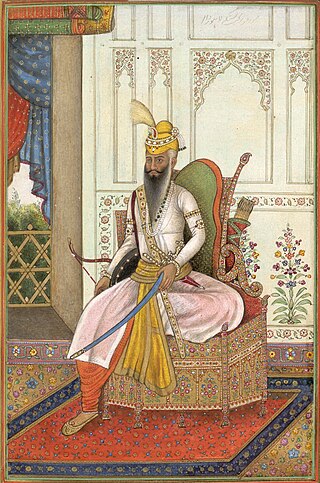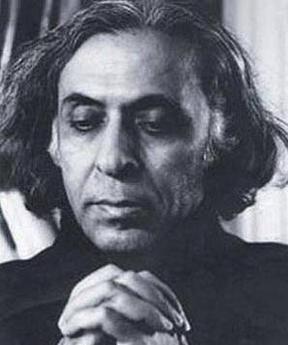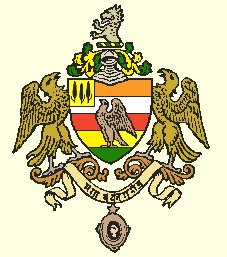
The Third Battle of Panipat took place on 14 January 1761 between the Maratha Confederacy and the invading army of the Durrani Empire. The battle took place in and around the city of Panipat, approximately 97 kilometres (60 mi) north of Delhi. The Afghans were supported by three key allies in India: Najib ad-Dawlah who persuaded the support of the Rohilla chiefs, elements of the declining Mughal Empire, and most prized the Oudh State under Shuja-ud-Daula. The Maratha army was led by Sadashivrao Bhau, who was third-highest authority of the Maratha Confederacy after the Chhatrapati and the Peshwa. The bulk of the Maratha army was stationed in the Deccan Plateau with the Peshwa.

The Indian National Congress (INC), colloquially the Congress Party or simply the Congress, is a political party in India with deep roots in most regions of India. Founded on 28 December 1885, it was the first modern nationalist movement to emerge in the British Empire in Asia and Africa. From the late 19th century, and especially after 1920, under the leadership of Mahatma Gandhi, the Congress became the principal leader of the Indian independence movement. The Congress led India to independence from the United Kingdom, and significantly influenced other anti-colonial nationalist movements in the British Empire.

Ranjit Singh, popularly known as Sher-e-Punjab or "Lion of Punjab", was the first Maharaja of the Sikh Empire, which ruled the northwest Indian subcontinent in the early half of the 19th century. He survived smallpox in infancy but lost sight in his left eye. He fought his first battle alongside his father at age 10. After his father died around Ranjit's early teenage years, Ranjit subsequently fought several wars to expel the Afghans throughout his teenage years. At the age of 21, he was proclaimed the "Maharaja of Punjab". His empire grew in the Punjab region under his leadership through 1839.
Khushwant SinghFKC was an Indian author, lawyer, diplomat, journalist and politician. His experience in the 1947 Partition of India inspired him to write Train to Pakistan in 1956, which became his most well-known novel.

Raja Rao was an Indian-American writer of English-language novels and short stories, whose works are deeply rooted in metaphysics. The Serpent and the Rope (1960), a semi-autobiographical novel recounting a search for spiritual truth in Europe and India, established him as one of the finest Indian prose stylists and won him the Sahitya Akademi Award in 1963. For the entire body of his work, Rao was awarded the Neustadt International Prize for Literature in 1988. Rao's wide-ranging body of work, spanning a number of genres, is seen as a varied and significant contribution to Indian English literature, as well as World literature as a whole.

Sawai Jai Singh II, was the 29th Kachwaha Rajput ruler of the Kingdom of Amber, who later founded the fortified city of Jaipur and made it his capital. He became the ruler of Amber at the age of 11, after the death of his father, Mirza Raja Bishan Singh, on 31 December 1699.

Medieval India refers to a long period of post-classical history of the Indian subcontinent between the "ancient period" and "modern period". It is usually regarded as running approximately from the breakup of the Gupta Empire in the 6th century CE to the start of the early modern period in 1526 with the start of the Mughal Empire, although some historians regard it as both starting and finishing later than these points. The medieval period is itself subdivided into the early medieval and late medieval eras.

The Rathore dynasty or Rathor dynasty was an Indian dynasty belonging to the Rathore clan of Rajputs that has historically ruled over parts of Rajasthan, Gujarat and Madhya Pradesh.

The Abhira kingdom in the Mahabharata is either of two kingdoms near the Sarasvati river. It was dominated by the Abhiras, sometimes referred to as Surabhira also, combining both Sura and Abhira kingdoms. Modern day Abhira territory lies within Northern areas of Gujarat and Southern Rajasthan, India.
Padmaja Naidu was an Indian freedom fighter and politician who was the 4th Governor of West Bengal from 3 November 1956 to 1 June 1967. She was the daughter of Sarojini Naidu.
Bhumihar, also locally called Bhuinhar and Babhan, is a Hindu caste mainly found in Bihar, the Purvanchal region of Uttar Pradesh, Jharkhand, the Bundelkhand region of Madhya Pradesh, and Nepal.

Pillaipundagudi Thiruvengadattaiyangar Srinivasa Iyengar (1863–1931) was an Indian historian, linguist and educationist who wrote books on the history of South India.
The Abhiras were a legendary people mentioned in ancient Indian epics and scriptures as early as the Vedas. they were a warlike tribe is admitted by all. Probably they were a nomadic people as they are associated with various peoples and provinces. A historical people of the same name are mentioned in the Periplus of the Erythraean Sea. The Mahabharata describes them as living near the seashore and on the bank of the Sarasvati River, near Somnath in Gujarat.
Janumpally Rameshwar Rao III (1923–1998) was an Indian lawyer, diplomat, member of parliament, and book publisher. Rao joined Indian Foreign Service in 1949 and served as commissioner for the Government of India in various African nations. He was elected as a Member of Parliament to the second, third, fourth, and fifth Lok Sabha successively during 1957–1977 from Mahabhubnagar constituency.

Araṇya-Kāṇḍa, or The Forest Episode, is the third book of the epic poem of Ramayana. It is also found in the Rāmcharitmānas. It follows the legend of Rama through his fourteen-year exile in the forest, joined by his wife and his brother. Rama overcomes challenges and demons by upholding standards of behavior. Nearing the end of his exile, Rama's wife Sita is kidnapped by the king Ravana, and Rama learns what happened. The story continues in the next book, Kiśkindhā Kāṇḍa.
Tekkatte Narayan Shanbhag (1925-2009) was an Indian scholar, bookseller and the founder of Strand Book Stores. He was credited with working to transform bookselling into a personal experience, prompting the writer Kushwant Singh, on a BBC show, to call Strand the only personal book shop in India. He was honoured by the Government of India in 2003 with Padma Shri, the fourth highest Indian civilian award.
The Battle of Bagru was a military engagement fought between multiple Indian kingdoms in 1748 near the town of Bagru, Jaipur, India. The battle was fought during a succession crisis following the death of Jai Singh II, which left Jaipur without effective leadership. In the battle, Madho Singh defeated ishwari Singh in a 6-day engagement with help of Marathas and Kingdom of Bundi.
The Raja Rao Award, in some sources the Raja Rao Award for Literature, is a former literary award named in honour of expatriate Indian writer Raja Rao, and bestowed "to recognize writers and scholars who have made an outstanding contribution to the Literature and Culture of the South Asian Diaspora." It has been described as "prestigious", and "an important Indian literary prize". It was bestowed by a jury upon seven recipients between its establishment in 2000 and its cessation in 2009. The award was given annually from 2000 to 2004, after which it was given biennially, with one award being given for 2005-2006, and one being given for 2007-2008.










